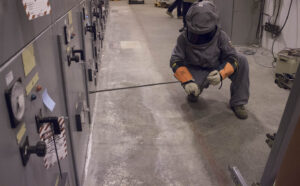Dickson, TN – On August 25, Dickson Electric Systems substation supervisor Zach Spicer suffered second-degree burns to his face and neck in an arc flash incident at the DES Old White Bluff Substation.
According to the victim’s sister-in-law, Spicer “was accessing a breaker cabinet, high voltage side when contact or an arc formed, causing an electrical fault that released heat and energy…He remembers stammering around and seeing everyone’s expression looking at him.”
Two days after the burns, doctors determined that Spicer had not lost his eyesight and during the skin graft surgery they were able to not only save his right hand, but also his fingertips.
Spicer remains at the Vanderbilt Medical Center Burn Unit where he has undergone three surgeries and numerous procedures.
A second Dickson Electric Systems employee also suffered severe b urns to his face and neck in the incident. He was released the evening of the accident and is recovering at home.
urns to his face and neck in the incident. He was released the evening of the accident and is recovering at home.
An Arc Flash is an electrical explosion caused by a fault condition or short circuit when either a phase to ground or phase to phase conductor is connected and current flows through the air. Arc flashes cause electrical equipment to explode, resulting in injury or death to workers and destruction of electrical equipment.
Temperatures can exceed 35,000° F. For reference, the surface of the sun is 9000° F. These extreme temperatures rapid heat and expand surrounding air – the extreme change in pressure is known as an arc blast. The arc flash and blast will likely vaporize all solid copper conductors. These conductors expand up to 67,000 times their original volume when vaporized. The arc flash and blast produce fire, intense light, pressure waves, and flying shrapnel.
When an arc flash happens, it does so without warning and is lightning quick. The result of this violent event is usually destruction of the equipment involved, fire, and severe injury or death to any nearby people. Proper safety and protection measures must be taken to limit the damage from an arc flash which include conducting an arc flash study, short circuit study, and NFPA 70E electrical safety training.
Read more from original source.
We are here to help you.